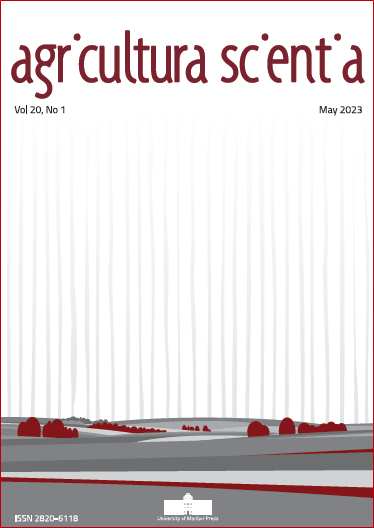Suckling Behaviour of Piglets Affected by Body Weight and Sex
DOI:
https://doi.org/10.18690/agricsci.20.1.4Keywords:
pig, lactation, body weight, sex, suckling position, suckling stability, suckling territoryAbstract
Piglet suckling behaviour has been extensively studied, but surprisingly, there are not many studies that specifically consider body weight and sex in this context. These two basic individual characteristics have been considered more as supporting data but not as main factors. Therefore, the objective of the present research was to examine the effect body weight on suckling behaviour of piglets during lactation separately by sex. The study comprised 14 litters with a total of 158 piglets (85 male, 73 female, litter size 6−15 piglets). Suckling behaviour was described in terms of suckling position (the teat at which the piglet suckled during suckling), suckling territory (the range two outermost suckling positions of the piglet encompasses) and suckling
stability (the tendency to suckle successively at the same position), and was observed in six periods: 0−3, 4−7, 8−10, 11−14, 15−21 and 22−32 days of age. In each period, piglets were also weighed. The udder was divided into three areas: anterior (1st-2nd teat pair), middle (3rd-5th teat pair) and posterior (6th-8th teat pair). Body weight affected suckling behaviour differently in male and female piglets (i.e., all traits in females, suckling stability only in males). The relative body weight of females decreased significantly from the anterior towards the posterior part. Heavy females (but not males) suckled considerably more frequently on the anterior area. Heavier piglets (male and female) established more stable suckling order. Suckling territory of males was quite large, but did not differ among body weight classes. Interestingly, light females visited significantly larger suckling territory than heavy females. The present results fill a gap in the otherwise broad knowledge of pig suckling behaviour, which is of great importance for litter management during lactation, especially when cross-fostering is implemented. In this context, knowledge of the detailed role of sex and body weight is of particular importance because breeders rely mainly on basic body traits when managing litters.
Downloads
Downloads
Published
Issue
Section
License
Copyright (c) 2023 Martina Dobaj Gomboc, Janko Skok, Dejan Škorjanc, Maja Prevolnik Povše

This work is licensed under a Creative Commons Attribution-NonCommercial-NoDerivatives 4.0 International License.
